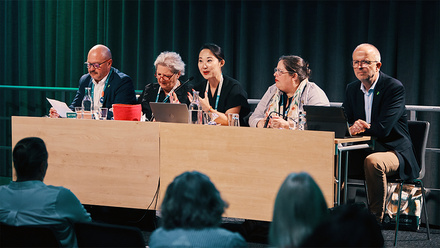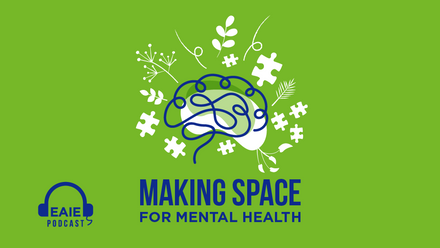Students as key collaborators

What do students think about the European Universities Initiative and other moves toward more structured collaboration in European higher education, and how can they be engaged as stakeholders in such programmes? Continuing with the launch of 2022 Summer Forum on ‘Collaborative Europe’, today’s blog looks at the current set of innovative policy initiatives through the student lens.
The last few years have seen several policy proposals at the European level related to higher education. Since the Sorbonne speech by President Macron in 2017, there has been a renewed interest in developing European policies that help to strengthen the higher education sector, make it more internationalised and prepare it to equip students and researchers with the right competencies to tackle the challenges of today’s world.
The student body is diverse and one size fits nobody
What do European students think about all these new initiatives? The European student movement has been quite vocal and involved in the implementation of flagship initiatives such as the European Universities Initiative, with organisations such as the European Students’ Union and our own Erasmus Student Network endorsing the processes, while expressing clear demands for student involvement, inclusion measures and democratic processes, among others.
Student perspectives
When it comes to the overall European youth, in 2018 the European Commission carried out a Flash Eurobarometer on the European Education Area in which young Europeans clearly expressed their support for the underlying principles behind some of the key policy priorities in international higher education: automatic recognition of qualifications (91% agree it would be useful); the creation of "EU Degrees delivered by networks of European Universities, offering the chance to study in different EU countries, with a flexible choice of courses or modules offered within the network" (93% agreed); work in innovative projects across disciplines; a European student card; and language learning. In the survey, young people were not asked about the technicalities of the proposals but about the objectives – which are indeed hard to oppose – but still, the level of support is remarkable.
Students want to engage, collaborate and build on their personal development
When we combine data from different Eurobarometers with our own ESNsurveys and other research projects such as SIEM, we observe certain trends that should be considered when designing student engagement strategies. Students do want to engage, collaborate and build on their personal development. Before reinventing the wheel in the internationalisation field we should prioritise making this interaction a reality, inside and outside of the classroom.
The ESNsurvey 2016 clearly shows that international and local students alike feel that they do not interact enough with their counterparts, and they would like to do so more often. More attention is needed to how universities (and especially university alliances) ensure that these interactions happen in a meaningful way. The biggest asset of an impactful internationalisation strategy is a diverse and international classroom where students from different cultures, backgrounds and walks of life learn from each other and cooperate to find inclusive and sustainable solutions.
Engaging with communities
Universities have a social responsibility to contribute to societal challenges with research activities and educating students with intercultural competences and leadership skills, instilling a sense of agency in students. In order to achieve this, community-engaged learning that puts civic engagement at its core should be prioritised. Policy initiatives such as the European Strategy for Universities have put civic engagement in the spotlight, and rightly so. Many great practices exist, but systematic implementation is still lacking.
Policy initiatives such as the European Strategy for Universities have put civic engagement in the spotlight, and rightly so
The topic can be approached from many angles but the bottom line is quite straightforward: encourage and support students to dedicate part of their education to contributing to their local community, and ensure a meaningful learning experience that is connected to learning objectives and is properly recognised with credits that count toward their degree. This offers the opportunity for a cross-sectoral approach engaging in a meaningful way with community stakeholders. In internationalisation of higher education it offers better integration opportunities for international students and a meaningful Internationalisation at Home experience for the local participants. The topic of community-engaged learning was explored in the SocialErasmus+ project, creating materials that are open to all higher education institutions. The importance of methodologies used by academics and university staff to facilitate this type of engagement supersedes the channels used, whether virtual, hybrid or physical.
As part of the broader civic engagement discussion, special attention to the participation of local students in international networks will help them develop relevant competences, create connections and live an international experience from their home universities. The methodology can be implemented in a flexible format, adjusting topics to the student’s and community’s needs and interests, ranging from sustainability to inclusion. There is no better way of boosting challenge-based education than confronting students with real-life cases that members of their community face.
Giving students agency
Empowering students with a sense of ownership and agency over the role they play in society is key to responsibilising communities. At the beginning of April, the Erasmus Student Network organised the largest student-led conference in the field of international education, the Erasmus Generation Meeting. In this event, participants were able to define their own learning paths, selecting from a wide range of topics, from supporting Ukrainian students to organising trips for large groups. The student body is diverse and one size fits nobody: not everyone can be a traditional student representative, but every single student can benefit from closer international collaboration with peers from different realities. What students need is to engage in collaborative experiences with peers that help them to develop a sense of belonging to a community and agency to set up new initiatives.
If we want to tackle the societal challenges we face today, the Erasmus+ programme needs to encourage students to be active participants during their exchange by volunteering and engaging with their host community. This experience will make each Erasmus student an ambassador of the programme and its message, multiplying the results of the investment in each participant ensuring impactful internationalisation for all.






